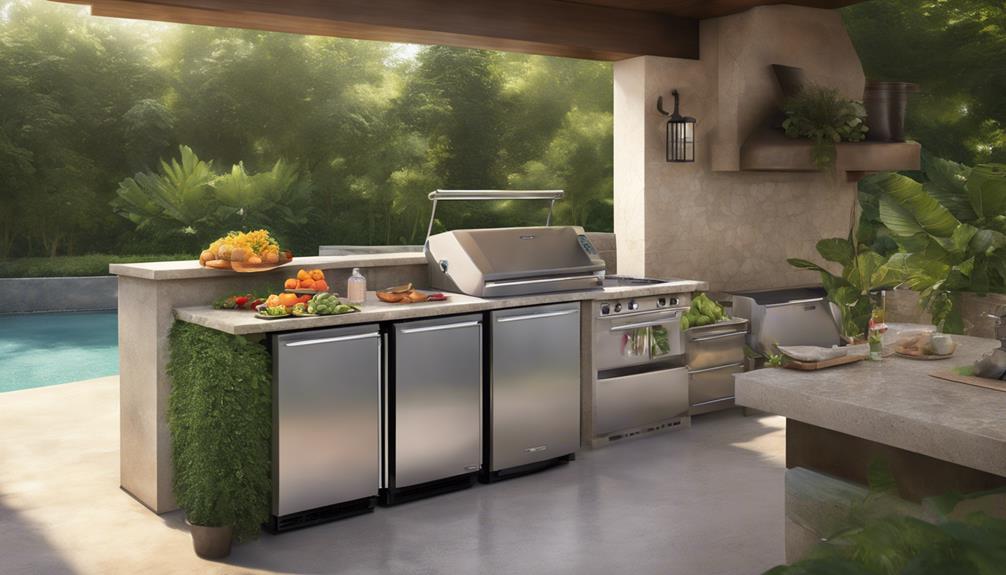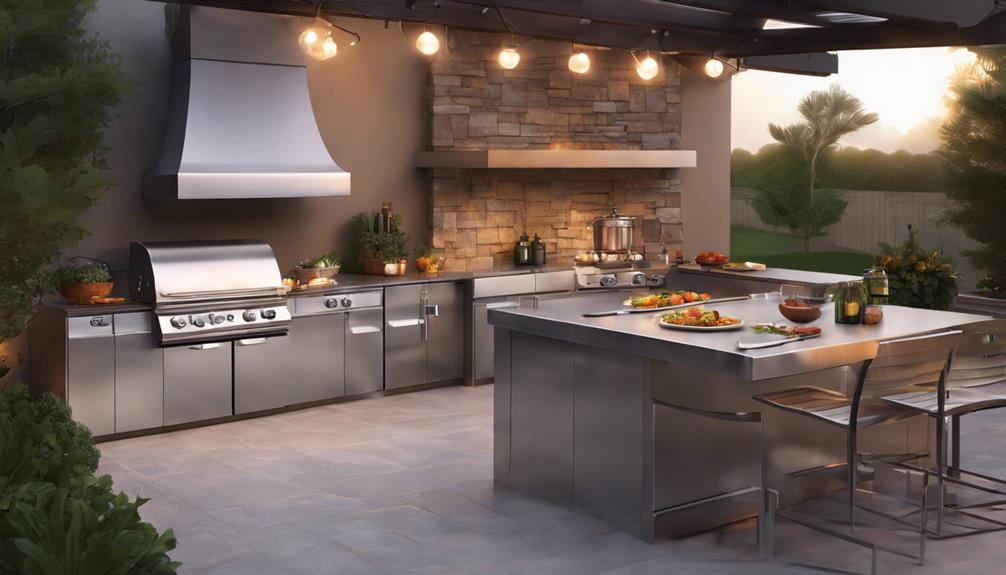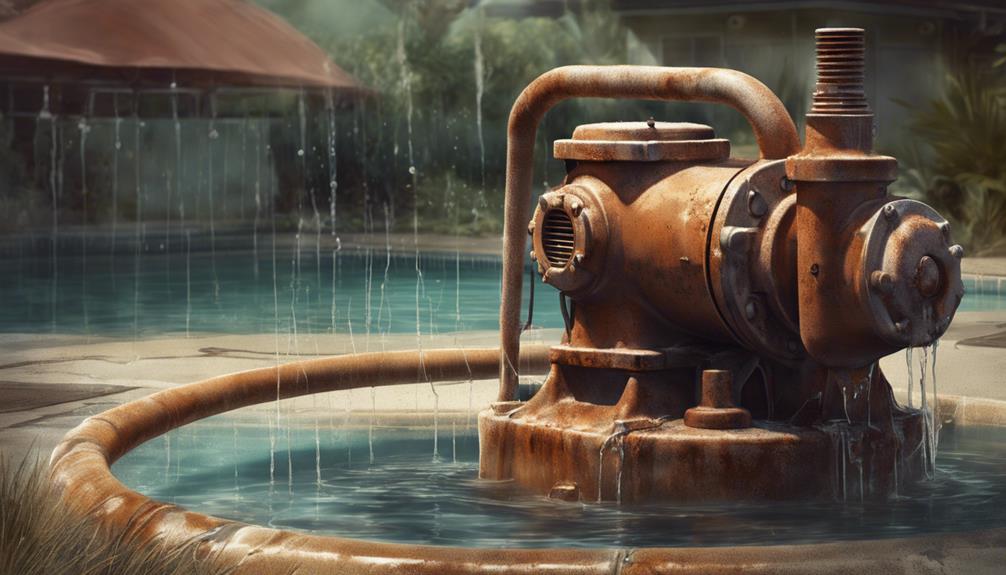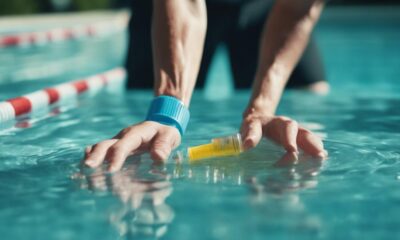Swimming Pools
Calculate Your Pool's Surface Area With These Easy Tips
Take charge of your pool's maintenance with these easy tips to accurately calculate its surface area, ensuring optimal treatment decisions.

To calculate your pool's surface area accurately, start by understanding the shape-specific formulas and measurements needed. For round pools, measure the diameter precisely. Rectangular or square pools require accurate length and width measurements aligned parallel to the edges. Calculate the rectangular area by multiplying the length and width. For circular areas, determine the radius for calculations. Triangular area involves multiplying half of the base by the height. Combine these individual areas for the total surface area. Check the pool depth at shallow and deep points. These tips guarantee precise calculations for proper maintenance and treatment decisions. More details await to enhance your pool area calculations.
Key Takeaways
- Measure pool length, width, and depth accurately for correct surface area calculation.
- Use specific formulas based on pool shape (circular, triangular, etc.) for accurate results.
- Convert all measurements to the same unit for consistency in calculations.
- Sum up individual surface areas of different sections for total pool area determination.
- Understanding pool area aids in maintenance, heating needs, and chemical treatments.
Pool Shape Selection
When determining the surface area of your pool, the first step is selecting the appropriate pool shape for accurate calculations.
The shape of your pool, whether it be round, rectangular, or square, plays an important role in determining the correct formula for calculating its surface area.
For round pools, you'll need to measure the diameter accurately to apply the correct equation.
In contrast, rectangular or square pools require precise measurements of the length and width to calculate the surface area effectively.
It's vital to make sure that your estimations align perfectly parallel to the edges of the pool to obtain accurate results.
Understanding the specific shape of your pool is fundamental in selecting the appropriate formula for calculating its surface area.
Gathering Necessary Measurements

To accurately calculate your pool's surface area, start by measuring the pool's length and width, and determine the shape of your pool. Make sure to take parallel measurements to the pool edges for precise calculations.
Understanding these points is essential for obtaining accurate results when determining the surface area of your pool.
Measure Pool Length
You can measure the length of your rectangular pool using a tape measure along one side, guaranteeing parallel measurements for accuracy.
To gather the necessary measurements effectively, follow these steps:
- Break Down Irregular Shapes: For irregular pools, simplify the shape into basic forms and measure individual lengths to determine the total length accurately.
- Consider Round Pools: In the case of round pools, the diameter measurement functions as the length. Make sure the diameter passes through the center for correct calculation of the pool's area.
- Precision is Key: Accurate length measurements are crucial for formulating the surface area formula and calculating the total area of the pool correctly.
- Account for Extensions: Gather all required length measurements, including any extensions or irregularities, to guarantee precise calculations of the pool's surface area.
Ensuring precise measurements will allow you to accurately calculate your pool's surface area for maintenance and other purposes.
Calculate Pool Width
Measuring the width of your pool involves determining the distance between its two longest parallel sides. For rectangular pools, this means finding the length of the pool's widest side.
Oval pools require locating the widest part to accurately measure the width. Similarly, with round pools, measuring the diameter across the widest point is essential to determine the width.
These precise width measurements are vital for calculating the surface area of your pool accurately. To guarantee an exact calculation, make sure to take parallel measurements to the pool edges.
Determine Pool Shape
Identify the shape of your pool to gather the necessary measurements for calculating its surface area accurately. When determining your pool shape, consider whether it's rectangular, circular, oval, or irregular. Each shape requires specific measurements and formulas to calculate surface area correctly.
Follow these steps to guarantee precise measurements:
- Rectangular Pools: Measure the length and width of the pool along the longest and widest points, aligning the measurements parallel to the pool's edges.
- Circular Pools: Measure the diameter across the pool to calculate the radius, making sure the measurements are taken accurately from one edge to the opposite edge through the center.
- Oval Pools: Measure the two axes (a and b) of the oval pool and the height (h), aligning the measurements parallel to the major and minor axes.
- Irregular Pools: Break down the irregular shape into simpler geometric forms to calculate the surface area accurately using known formulas for those shapes.
Measuring Pool Length

To measure the length of your pool accurately, focus on a specific side and use a tape measure. For a rectangular or square pool, place the tape measure along one of the longer sides and measure from end to end.
In the case of circular pools, determine the diameter by measuring from one edge to the opposite edge, passing through the center. Oval pools require measuring the longest straight line across the pool and then taking a perpendicular measurement for accurate length calculation.
Remember, precise length measurements are crucial for accurately calculating the pool's surface area. Double-check your measurements to guarantee precision in determining the pool's length.
Measuring Pool Width

When determining the width of your rectangular pool, focus on measuring the distance between the two longest parallel sides. This measurement is important for accurate surface area calculations and maintenance planning.
Here are some key points to keep in mind:
- Rectangular Pool: Measure the width by determining the distance between the longest parallel sides.
- Square Pool: In a square pool, the width is the same as the length, as all sides are equal.
- Circular Pool: The diameter measurement serves as the width across the center of a circular pool.
- Oval Pool: Measure the widest point for accurate width calculation in oval pools.
Ensuring you measure the width of your pool correctly is essential for accurate surface area calculations and efficient maintenance. By focusing on this step, you set the foundation for proper pool care and management.
Calculating Rectangular Area

To calculate the surface area of a rectangular pool, you'll multiply the length by the width to get the base area.
The formula for the area of a rectangle is 2lw + 2lh + 2wh, where l is the length, w is the width, and h is the height.
This computation is essential for accurately determining the amount of materials needed for pool maintenance and renovation.
Length X Width Calculation
Calculating the surface area of a rectangular pool involves multiplying the length and width measurements. To guarantee an accurate result, make sure both the length and width are in the same unit of measurement before performing the calculation.
The formula for the rectangular pool area is simplified to lw, making it a straightforward process for pools with a simple shape. Accurate measurements of both the length and width are essential for precise surface area calculation, as any errors in these measurements will affect the final result.
Formula for Area
The formula for calculating the surface area of a rectangular pool involves adding the products of length and width with width and height, resulting in 2lw + 2lh + 2wh.
By understanding this formula, you can accurately determine the total surface area of your pool or spa. This calculation includes considering all sides: the top and bottom (length x width), the front and back (width x height), and the sides (length x height).
Knowing the dimensions of your rectangular pool is essential for various reasons. It aids in estimating chemical dosing accurately, sizing equipment appropriately, simplifying maintenance planning, tackling renovation projects effectively, and ensuring compliance with regulations.
Utilizing the correct formula for a rectangular pool guarantees precise surface area determination, which has a significant impact on decisions related to pool finish and maintenance requirements.
Therefore, mastering the formula for calculating the area of your pool is vital for effective pool management and enjoyment.
Calculating Circular Area

Measure the radius of your circular pool by finding half the diameter from the center to the edge.
Once you have the radius, you can calculate the surface area using the formula 2πr² + 2πrh, where r represents the radius and h stands for the height of the pool.
Here are some key points to keep in mind when calculating the circular area of your swimming pool:
- The radius is essential in determining the area of the pool, so make sure to take an accurate measurement from the center to the edge.
- The height of the pool, from the water surface to the bottom, also plays a significant role in the surface area calculation.
- Make sure to convert all measurements to the same unit system before applying them to the formula for accurate results.
- Calculating the circular area not only helps in determining the pool's surface area but also aids in decisions regarding pool finishes, chemical treatments, and heating system requirements.
Calculating Triangular Area

To determine the area of a triangle, you need to identify the base and height measurements. The base is the bottom side of the triangle, and the height is the perpendicular distance from the base to the opposite vertex.
Measure the base of the triangular area across the bottom and make sure the height is a perpendicular line from the base to the opposite vertex. Make sure both the base and height measurements are in the same unit, such as feet or meters, before calculating the area.
Once you have these measurements, plug them into the formula A = 0.5 * base * height to find the triangular section's area accurately.
Understanding this calculation method is essential for accurately determining your pool's total surface area with different shapes and sections.
If you require further assistance or have any questions, feel free to contact us at the provided phone number for guidance.
Adding Up Total Surface Area

For a precise assessment of your pool's total surface area, integrate all the individual surface areas of its various shapes using the appropriate formulas. Make sure to convert all measurements to the same unit before applying the formulas to guarantee accuracy.
Here are some key steps to help you add up the total surface area effectively:
- Gather your measuring tape and note down the dimensions of each section of your pool accurately.
- Use the designated formula for each shape present in your pool, such as rectangular, circular, oval, or irregular, to calculate the individual surface areas.
- Add up all the calculated surface areas to obtain the total surface area of your pool.
- Remember that an accurate total surface area calculation is essential for several aspects like pool finish selection, determining chemical requirements, and appropriately sizing components for heating and filtration systems.
Checking Depth for Accurate Calculation

Guarantee accurate calculations by verifying the depth of your pool from the bottom to the top of the pool wall using a tape measure in feet. Understanding the pool depth is crucial for accurate surface area calculations and effective maintenance planning.
If the depth of your pool varies, measure and note the depth at both the shallowest and deepest points. To calculate the average depth, add the shallowest and deepest depths together, then divide by two. This average depth will provide a more precise representation of your pool's overall depth for calculations.
Accurate pool depth measurements play an essential role in determining the water volume, appropriate chemical dosing, and sizing equipment correctly for efficient pool maintenance. Make sure to regularly monitor and update your pool depth measurements to guarantee accurate surface area calculations and to facilitate efficient pool maintenance routines.
Frequently Asked Questions
How to Calculate Surface Area of Pool?
To calculate the surface area of a pool, you need to take into account its shape.
For a rectangular pool, use the formula 2lw + 2lh + 2wh.
Circular pools require 2πr^2 + 2πrh.
Oval pools use πab + (a + b)√((a – b)^2 / 4 + h^2).
Irregular pools entail breaking them down into simpler shapes.
Always convert measurements to the same unit for accurate results.
How to Calculate Water Surface Area?
To calculate water surface area, measure the length and width of the pool. For a rectangular pool, multiply the length by the width.
For a circular pool, use the formula 3.14 times the radius squared.
For an oval pool, use the formula pi times a times b. Irregular pool shapes can be divided into simpler shapes for calculation.
Accurate surface area determination helps in pool maintenance, chemical balance, and equipment sizing.
How to Calculate Surface Area?
To calculate surface area, use the appropriate formula based on your pool shape. For rectangular pools, the formula is 2lw + 2lh + 2wh. For circular pools, it is 2πr^2 + 2πrh. For oval pools, use the formula πab + (a + b)√((a – b)^2 / 4 + h^2). Break down irregular shapes if needed. Convert measurements to the same unit for accuracy.
Consider factors like pool depth, features, and size. Utilize a surface area calculator for precision in determining your pool's surface area.
How to Calculate the Square Footage of a Swimming Pool?
To calculate the square footage of a swimming pool, you need to measure its dimensions based on the shape of the pool. For a rectangular pool, measure the length and width. For circular pools, measure the radius and height. Once you have these measurements, apply the appropriate formulas to determine the surface area.
For irregularly shaped pools, it's best to break them down into simpler forms to ensure accurate calculations. Precise determination of the surface area is crucial for various aspects such as maintenance, chemical balancing, and equipment sizing.
Accurate measurements are essential for the optimal functioning and aesthetics of the pool. Avoid potential issues that may arise from inaccurate calculations by ensuring meticulous measurement techniques are used.
Conclusion
To accurately calculate your pool's surface area, remember to carefully measure the length, width, and depth of the pool. By following the steps outlined in this article, you can guarantee a precise calculation of the total surface area.
Remember, precision in measurement is key to accurately determining the amount of materials needed for maintenance and renovations. Stay diligent in your calculations to enjoy a well-maintained pool for years to come.
Swimming Pools
Hot Trends Cooking Up in Outdoor Kitchens
Feast your eyes on the latest trends in outdoor kitchens, from innovative cooking gear to stylish design elements – find out more about what's sizzling!

Explore the hottest trends in outdoor kitchens, from innovative cooking equipment like multi-burner stovetops and wood-fired pizza ovens to stylish design materials such as stainless steel and granite countertops. Refrigeration solutions offer sub-zero refrigerators and wine coolers for premium storage. Enhance your outdoor culinary experience with entertainment features like flat-screen TVs, outdoor speakers, and heating lamps for comfort. The latest trends include smart technology integration, eco-friendly choices, and modular kitchen setups for flexibility. Stay ahead of the curve and elevate your outdoor kitchen to new heights with these cutting-edge advancements.
Key Takeaways
- Smart technology integration for remote monitoring and control.
- Eco-friendly features such as solar-powered appliances.
- Modular kitchen setups for versatile outdoor cooking.
- Outdoor bars and beverage stations for entertaining guests.
- Sustainable materials like composite decking for eco-conscious design.
Cooking Equipment Innovations
The evolution of cooking equipment in outdoor kitchens showcases a shift towards high-performance features and customization options to elevate the culinary experience.
Multi-burner stovetops with high BTU outputs and precise temperature control are becoming increasingly popular for versatile cooking.
Colored grills offer a unique customization opportunity, adding a personal touch to outdoor cooking spaces.
Wood-fired pizza ovens are in demand for creating gourmet pizzas with a distinct smoky flavor.
Built-in deep fryers expand menu options, allowing for a variety of fried foods to be prepared outdoors.
Ice makers are also essential for crafting invigorating cocktails and keeping seafood dishes chilled, catering to a range of culinary preferences in outdoor kitchen design.
Stylish Design Materials
Stainless steel cabinets and granite countertops are prominent choices for adding a touch of luxury and durability to outdoor kitchen design. These materials not only provide a sophisticated look but also offer excellent resistance to the elements, ensuring longevity and easy maintenance.
| Design Material | Description | Benefits |
|---|---|---|
| Stainless Steel | Modern and sleek appearance | Weather-proof and durable |
| Granite Countertops | Luxurious and elegant | Scratch and heat resistant |
| Coordinated Furniture Sets | Consistent design aesthetic | Creates a cohesive look |
| Fireplace & Fire Table | Adds warmth and ambiance | Focal point for gatherings |
| Ceiling Fans | Enhances comfort and style | Provides cooling breeze |
Refrigeration Solutions

Prominent in outdoor kitchen design, refrigeration solutions play an essential role in ensuring the functionality and convenience of these culinary spaces.
When it comes to refrigeration trends, outdoor kitchens are now equipped with a range of innovative solutions:
- Sub-zero refrigerators for best storage of perishable items
- Wine refrigerators designed to preserve fine vintages at the ideal temperature
- In-place ice makers for easy access to ice for drinks and dishes
- Outdoor refrigerators that provide quick and convenient storage outdoors
- Upscale brand choices offering not only performance but also a touch of luxury and style to outdoor refrigeration units.
Entertainment & Comfort Enhancements
Enhancing the outdoor kitchen experience, entertainment, and comfort features are becoming increasingly popular in modern designs. As homeowners seek to create inviting and functional outdoor spaces, the incorporation of entertainment and comfort enhancements plays a key role. From flat-screen televisions for entertainment to high-quality sound systems for ambiance, outdoor kitchens are now equipped with a range of amenities to elevate the overall experience. Lighting not only enhances safety during food prep but also adds to the ambiance of the space. Heating lamps and lights provide warmth for chilly evenings, ensuring that the outdoor kitchen remains a comfortable gathering spot. Coordinated furniture sets further enhance the comfort and style of the outdoor kitchen area.
| Entertainment Features | Comfort Enhancements | Lighting |
|---|---|---|
| Flat-screen televisions | Heating lamps | Ambient lighting |
| High-quality sound systems | Coordinated furniture sets | Task lighting |
| Outdoor speakers | Plush seating | Decorative lighting |
Latest Outdoor Kitchen Trends

The evolving landscape of outdoor kitchen design is witnessing a surge in demand for cutting-edge cooking equipment and innovative design materials. Outdoor kitchens are now incorporating the latest trends to elevate the cooking and dining experience.
The most recent trends include:
- Smart technology integration for remote control and monitoring
- Eco-friendly features such as solar-powered appliances
- Modular kitchen setups for flexibility and customization
- Outdoor bars and beverage stations for entertainment
- Sustainable and low-maintenance materials like composite decking
These trends not only enhance the functionality of outdoor kitchens but also contribute to creating stylish and sustainable outdoor culinary spaces for homeowners to enjoy with family and friends.
Frequently Asked Questions
What Are the Maintenance Requirements for Outdoor Kitchen Equipment?
Maintaining outdoor kitchen equipment involves regular cleaning to prevent grease buildup, inspecting for wear and tear on components, ensuring proper storage during off-seasons, and scheduling professional maintenance for specialized items like refrigerators and wood-fired ovens.
How Can I Protect My Outdoor Kitchen From Harsh Weather Conditions?
To safeguard your outdoor kitchen from harsh weather conditions, confirm all equipment is made from weather-proof materials like stainless steel. Use covers for grills and appliances when not in use. Invest in a quality roof or canopy to shield the area from rain and sun damage.
Are There Any Eco-Friendly Options Available for Outdoor Kitchen Materials?
There are several eco-friendly options available for outdoor kitchen materials. Sustainable choices like reclaimed wood, bamboo, recycled plastic, and composite materials offer durability while minimizing environmental impact. These options blend functionality with eco-conscious design principles.
What Are Some Creative Ways to Incorporate Greenery Into the Outdoor Kitchen Design?
Incorporating greenery in outdoor kitchens can enhance aesthetics and promote sustainability. A study by the National Kitchen and Bath Association found that 78% of homeowners desire greenery in their outdoor kitchen design, showcasing a growing trend towards eco-conscious living.
How Can I Optimize Space in a Smaller Outdoor Kitchen Area?
To optimize space in a smaller outdoor kitchen area, focus on multifunctional equipment like compact grills with side burners, stackable storage solutions, and foldable furniture. Utilize vertical space for storage and consider a portable kitchen island for added workspace flexibility.
Conclusion
The evolution of outdoor kitchens is revolutionizing the way we cook and entertain outdoors. With cutting-edge cooking equipment, stylish design materials, refrigeration solutions, and entertainment enhancements, outdoor kitchens are becoming the epitome of luxury and functionality.
From gourmet dining experiences to ultimate relaxation, the latest trends in outdoor kitchens are setting a new standard for outdoor living spaces. Prepare to be amazed as outdoor kitchens transform into the ultimate culinary and entertainment paradise.
Swimming Pools
Make a Splash: Transform Small Backyards Now
Amplify your small backyard's charm with innovative design tips to create a stunning outdoor sanctuary.

Transform your compact backyard into a stunning outdoor haven with strategic design elements. Utilize vertical space solutions like plunge pools and maximize efficiency without compromising visual appeal. Creative water features, versatile furniture, vibrant greenery, and thoughtful lighting can transform your space into a tranquil retreat. Elevate ambiance, enhance functionality, and make the most of your outdoor area. With careful planning and the right elements, your small backyard can become a stylish oasis that you'll love.RuntimeObject Unleash the full potential of your outdoor space!
Key Takeaways
- Utilize vertical space with plunge pools for ground-saving solutions.
- Incorporate creative water features for visual appeal and relaxation.
- Opt for multi-purpose furniture to maximize functionality in small spaces.
- Enhance with vibrant greenery and privacy features for a tranquil retreat.
- Illuminate your small backyard with strategic lighting for ambiance and spaciousness.
Embrace Vertical Space Solutions
In small backyards, the strategic utilization of vertical space offers innovative solutions to enhance pool areas and create visually appealing outdoor environments. By installing sleek plunge pools that save ground space, homeowners can free up valuable square footage for lounging decks or seating arrangements.
Utilizing verticality in pool zone design not only maximizes space efficiency but also enhances the visual appeal of the area. This approach allows for the creation of visually stunning pool areas despite space constraints, offering a balance between functionality and aesthetics.
Embracing vertical space solutions opens up a world of possibilities for transforming small backyards into inviting and stylish outdoor retreats, where every inch is utilized wisely to create a harmonious and visually pleasing environment.
Install Creative Water Features
Utilizing creative water features in small backyards can elevate the ambiance and transform the outdoor space into a mesmerizing oasis. By incorporating alluring elements like cascading waterfalls or elegant fountains, you can enhance the visual appeal and create a tranquil atmosphere within your personal paradise.
These features not only add a touch of luxury but also help in maximizing the illusion of space by introducing striking visual elements that draw the eye upwards. The soothing sounds of flowing water further contribute to a relaxing environment, making your small backyard feel like a serene retreat.
Whether it's a small pond, a decorative fountain, or a series of waterfalls, creative water features can truly enhance the beauty and charm of your outdoor space.
Incorporate Multi-Purpose Furniture

Incorporating versatile furniture solutions maximizes functionality in small backyard spaces, offering practicality without compromising on aesthetics. Investing in dual-function furniture pieces allows for efficient use of limited space.
Hidden storage ottomans help declutter the area, while foldable tables and chairs provide flexibility for easy storage when not in use. These multi-purpose furniture items enable homeowners to maximize their backyard without sacrificing comfort or style.
Innovative designs cater to the specific needs of small areas, ensuring that every piece serves a dual role in enhancing the overall functionality of the space. By choosing furniture that is both practical and visually appealing, individuals can create a welcoming and efficient outdoor oasis within the constraints of a small backyard.
Enhance With Vibrant Greenery & Privacy
Enhancing small backyards with vibrant greenery and privacy features elevates both the aesthetic appeal and seclusion of the outdoor space. By adding lush greenery such as vertical gardens or hanging planters, you not only introduce natural beauty but also enhance privacy.
The presence of green accents softens the overall look, creating a welcoming and intimate oasis around your pool area. The strategic placement of plants helps in defining the space and providing a sense of enclosure.
Additionally, the incorporation of greenery contributes to a calming atmosphere, perfect for relaxation and unwinding. With careful selection and placement of plants, you can transform your small backyard into a tranquil retreat that offers both beauty and privacy.
Illuminate Your Small Backyard

Enhance the ambiance of your small backyard with strategically placed lighting fixtures. Illuminate pathways, seating areas, and water features with soft ambient lighting and accent lights.
As the sun sets, create a magical atmosphere in your outdoor space by incorporating pathway lights to guide the way and underwater lights to add a serene glow to your pool.
Highlight key elements like trees, plants, or sculptures with spotlights for added visual interest. By thoughtfully placing lights throughout your small backyard, you can expand visual boundaries, making the space feel larger and more inviting during the evening hours.
Let there be light in your outdoor oasis, transforming it into a mesmerizing retreat after dark.
Frequently Asked Questions
Can I Add a Fire Feature to Complement the Water Elements in My Small Backyard Oasis?
Adding a fire feature can complement water elements in your small backyard oasis. Consider a fire pit or a sleek fire bowl for warmth and ambiance. Balance the elements carefully to create a harmonious and inviting outdoor space.
How Can I Incorporate a Small Outdoor Kitchen or Bar Area Near My Pool?
Adding a small outdoor kitchen or bar area near your pool can enhance the functionality and entertainment value of your backyard oasis. Optimize space with compact appliances, multifunctional furniture, and stylish storage solutions.
Are There Options for Integrating a Sound System Into a Compact Pool Space?
Options for integrating a sound system into a compact pool space include waterproof Bluetooth speakers, in-wall or ceiling speakers, and hidden subwoofers. Choose high-quality, weather-resistant audio components to enhance your pool area with music and entertainment.
What Are Some Innovative Ways to Incorporate Recycled Materials Into My Backyard Design?
Innovative ways to incorporate recycled materials into your backyard design include repurposing old wood for decking, using reclaimed bricks for pathways, creating planters from recycled containers, and integrating salvaged metal for artistic accents.
How Can I Create a Sense of Depth and Spaciousness in a Small Backyard Pool Area?
To create a sense of depth and spaciousness in a small backyard pool area, utilize vertical space with sleek plunge pools, incorporate alluring water features like cascading waterfalls, opt for multi-purpose furniture, enhance with vibrant greenery, and strategically light the area for a magical ambiance.
Conclusion
To sum up, the transformation of small backyards into enchanting retreats demands strategic planning and creative design choices. By embracing vertical space, incorporating water features, utilizing multi-functional furniture, adding vibrant greenery, and enhancing with lighting, a magical oasis can be created.
Remember, 'good things come in small packages,' and with thoughtful consideration and innovative solutions, even the smallest outdoor spaces can be turned into inviting and visually stunning environments for relaxation and entertainment.
Swimming Pools
Pool Pump Woes: Time for Replacement
Get ahead of your pool pump problems with this guide to signs it's time for a replacement – don't miss out on crucial maintenance tips!

When experiencing pool pump issues such as leaks, decreased performance, and high energy usage, it might be time to replace the pump. Pay attention to signs like irregular noises, decreased efficiency, and age-related decline. Addressing pump leaks promptly by tightening fittings or seeking professional help is essential. Keeping up with regular maintenance can extend the pump's lifespan, enhance performance, and prevent costly repairs. Consider factors like noise, age, and maintenance practices to guarantee your pool pump operates efficiently. Understanding these aspects can guide you in making informed decisions about your pool pump replacement needs.
Key Takeaways
- Pool pump leaks, decreased performance, increased energy consumption, and age nearing 12 years indicate replacement.
- Address strange noises promptly to prevent further damage and maintain pump efficiency.
- Deal with pump leaks by tightening fittings, repairing water leaks, and seeking professional help for complex issues.
- Recognize the impact of age on pump functionality and seek professional advice for accurate diagnosis.
- Regular maintenance extends pump lifespan, improves performance, reduces energy consumption, and prevents costly repairs.
Signs of Pool Pump Replacement
When considering pool pump replacement, it is crucial to recognize the distinct signs indicating the necessity for a new pump. Unmanageable or constant pump leaks are a clear indication that the pump may need replacement.
Additionally, an old pump nearing the end of its lifespan, typically around 12 years, may exhibit decreased performance, such as lagging startup or an overheating motor. Increased energy consumption is another sign that the pump is not functioning at its best.
Strange Noises and Their Implications
Identification of distinctive sounds emerging from your pool pump can provide valuable insights into potential issues impacting its operation and efficiency. When unusual noises are present, it is important to address them promptly to prevent further damage.
Here are some implications of these noises:
- Anxiety: Hearing irregular noises can cause worry about possible water level issues.
- Frustration: Vibrations from filter malfunctions can be irritating and disruptive to the pool environment.
- Concern: Identifying the source of the noise can be worrying, prompting the need for professional advice and intervention to guarantee the pump's longevity and performance.
Dealing With Pump Leaks Effectively

Efficiently addressing pump leaks is important for maintaining the integrity and functionality of your pool system. When dealing with pump leaks, it is vital to act promptly to prevent further damage. Here are common types of pump leaks and how to handle them effectively:
| Type of Pump Leak | Action Required |
|---|---|
| Loose pump lids or valves | Tighten fittings or replace seals |
| Water leaks | Identify source and repair promptly |
| Side suction or shaft seal leaks | Seek professional assistance |
| Cracked pump housing | Replace housing or consult expert |
| Corroded pump parts | Replace affected components |
Recognizing the Age Factor
Understanding the pivotal role of age in evaluating pool pump performance is fundamental for proactive maintenance and timely replacements. As pool pumps age, their efficiency and reliability may decline, leading to potential issues that can impact the overall functionality of the pool system.
To recognize the age factor effectively, consider the following:
- Pump Lifespan: Pool pumps typically have a lifespan of up to 12 years.
- Signs of Deterioration: Look out for lagging startup, overheating motors, and defective bearings.
- Professional Consultation: Seeking advice from a pool expert can help diagnose pump issues accurately and determine if a replacement is necessary.
Importance of Regular Maintenance

Regular maintenance of pool pumps is important for guaranteeing best performance and prolonging their lifespan. By implementing a consistent maintenance schedule, pool owners can prevent costly repairs and guarantee their pool pump operates efficiently. Here is a breakdown of why regular maintenance is essential:
| Benefits of Regular Maintenance |
|---|
| 1. Extends pump lifespan |
| 2. Improves pump performance |
| 3. Reduces energy consumption |
Regularly servicing pool pumps not only saves money in the long run but also maintains a safe and enjoyable swimming environment. Trusting professional pool technicians for regular maintenance can help identify and address issues before they escalate, ultimately maximizing the pump's longevity.
Frequently Asked Questions
Can I Replace My Pool Pump on My Own?
Replacing a pool pump independently requires technical expertise. Factors like electrical connections and plumbing must be considered. Professional assistance is recommended for safety and efficiency to guarantee proper installation and peak pump performance.
Are Energy-Efficient Pumps Worth the Investment?
Investing in energy-efficient pumps symbolizes a commitment to sustainability. They optimize pool operation, reduce energy costs, and promote environmental stewardship. Upgrading guarantees long-term savings and aligns with modern trends for eco-conscious pool ownership.
How Often Should I Clean My Pool Pump?
Regular cleaning of your pool pump is recommended at least every 3 months to maintain peak performance. However, factors like pool usage and environmental conditions may require more frequent cleaning. Consult a pool maintenance professional for personalized advice.
What Are the Benefits of Variable-Speed Pumps?
Variable-speed pumps offer numerous benefits, including energy efficiency, quieter operation, and customizable flow rates. They help reduce energy costs and provide better filtration, circulation, and heating for pools. Upgrading to a variable-speed pump can enhance overall pool performance.
Can a Pool Pump Upgrade Increase My Property Value?
Upgrading your pool pump can increase property value by enhancing energy efficiency, water circulation, and overall aesthetic appeal. Professional installation and maintenance guarantee peak performance, attracting potential buyers with a well-maintained pool system.
Conclusion
By examining the warning signs and understanding the importance of proactive maintenance in pool pump replacement, it becomes evident that addressing issues promptly can prevent further damage and extend the lifespan of pool equipment.
The theory that regular maintenance and timely replacement of pool pumps can enhance system performance and prevent costly repairs is indeed true, emphasizing the critical role of professional expertise in maintaining an efficient pool system.
-

 Relaxation2 months ago
Relaxation2 months agoCreate a Relaxing Oasis: Top Poolside Lounging Ideas
-

 Vetted2 months ago
Vetted2 months ago15 Best Robot Vacuums for Pools to Keep Your Pool Sparkling Clean
-

 Health Benefits2 months ago
Health Benefits2 months agoDoes Swimming Pool Water Damage Teeth?
-

 Swimming Pools2 months ago
Swimming Pools2 months agoDo-It-Yourself: Inspiring DIY Swimming Pool Ideas
-

 Swimming Pools2 months ago
Swimming Pools2 months agoEntrepreneur's Guide: How to Start a Swimming Pool Business
-

 Pool Maintenance2 months ago
Pool Maintenance2 months agoMaster Chemical Balancing: Secrets to a Safe and Crystal-Clear Pool
-

 Swimming Pools2 months ago
Swimming Pools2 months agoDIY Fun: Homemade Swimming Pool Ideas
-

 Aesthetic and Design2 months ago
Aesthetic and Design2 months agoSmall Wonders: Small Garden Swimming Pool Ideas
















